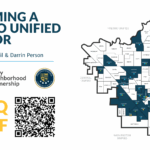This idea is most easily understood through an example:
Say your church begins serving in a neighborhood and you realize that access to food there is an issue. So you start a food pantry. The church is very excited about this, and many members drop off food to pass out. Several members even volunteer to lead the pantry. But, since you are holistically minded, as you begin the project you open your eyes, start asking questions, and thru listening to others, you realize that…
- The neighborhood is not very walkable. Busy streets, a lack of crosswalks, and some crumbling sideways cause people not to go outside of their houses and apartments much. You are going to need to figure out who from the government can help fix the city infrastructure, and how more crosswalks and lights can be added. Does your church know anyone in Government? Can you reach out to your local council member and start a conversation?
- There is a lack of grocery stores in the area which sell healthy food and vegetables. There are also no community gardens. The community has gotten used to eating without fruits and vegetables. Therefore, even if there was access to healthy foods, the neighborhood residents would not buy them. Part of this stems from what is advertised to their kids at the stores and in the media. Who can help in your conversation with the store owners, the non-profit that does community gardens, and media companies who take part in advertising?
- Other churches in the neighborhood seem to be concerned only with spiritual hunger and “feeding souls”. They do not see physical hunger as an issue. In learning from the people you are serving, you keep hearing that the food you are passing out is not culturally appropriate and would not be eaten at residents’ homes. It is now time to engage the other churches to partner together, and shift your ministry methods.
- Generational diabetes, lack of exercise, and health issues have become accepted as a new norm. Finding ways to work with families to create new, healthy habits, such as walking, might be a way to create a family culture of health.
Register Today!
Photo Credit:Raúl Nájera







Leave a Reply